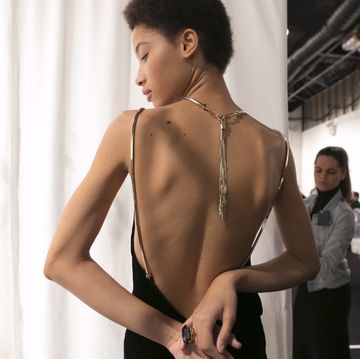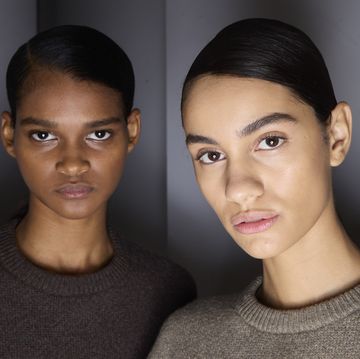Anxious thoughts have defined Georgia Pritchetts’ life since childhood, but since recognising the ways fretting has made her a better person, she’s quit worrying about worrying and embraced the positives of being perpetually perturbed.
I was raised in a household of worries. It’s family legend that my older brother’s first words were an apology to the ground after he’d fallen over. I remember sitting in my buggy, worrying about sitting on the potty. I was known to chew my dummy anxiously. Worrying was a family activity: even the dog joined in, before being prescribed puppy Prozac after a bleak few weeks of staring at the walls and sighing.
As a child, I used to worry about the monsters under my bed. Not whether they existed, obviously there were monsters under the bed. My worry was, were they comfy? How could they sleep on a hard floor surrounded by dust? Sometimes I slept under the bed so that they could have a turn on top.
My mum tried to help with my anxiety by buying me a teddy – someone who I could tell my worries to. But you only had to look at the bear to see that he had some serious issues. His eyebrows were knitted (in both senses), his little mouth was wonky and his ears looked extremely perturbed. I named him Anxious Bear. I tried to help him, but this was a bear with multiple neuroses... Or was that me?
For a neurotic child, the most innocuous comments would trigger a worry spiral. If I left a piece of Lego on the floor, my grandmother would point an accusing finger at it and say, ‘What if the Queen comes round for tea?’ She said this a lot. I began to be really scared of the Queen. The threat of one of her impromptu visits constantly hovered over me.
I knew that my worrying was extreme, but it never occurred to me that there was anything wrong with it; I presumed everyone’s minds worked in the same way. And, yes, worrying was an obsession, but it never tipped over into a psychological problem or necessitated medical intervention. While anxiety as a psychiatric disorder is utterly crippling, for me, worrying was more like a hobby. It was just how I was wired.
But around the time I turned 13, it became increasingly apparent that I was, in fact, different from my friends. And, as a teenager, ‘different’ is the very last thing you want to be. My classmates would be worrying about their nails or hair, and I would be worrying whether I had Robertson’s Giant Limb – a rare condition that causes one limb to be ginormous. I kept measuring my legs against each other.
I envied my friends and their (relatively) carefree existences. This, of course, made me start worrying about the amount of time I spent worrying. I was different from other people and I really, really didn’t want to be. It was a terrible feeling when I was younger, but I carried the fear into adulthood, too, where the worrying about worrying consumed me. It restricted my life in numerous ways, from meeting people (going to parties was a nightmare: what will I wear? Will I choke on a canapé? Will a block of frozen wee fall from an aeroplane while I walk there?) to love. It’s a challenge to maintain a relationship if, as a former partner told me, at any given moment half of the couple has already mentally worked through every possible negative outcome.
Professionally, there have been challenges, too. I’m a script writer, and I’ve had to work especially hard not just to stop worrying for long enough to write, but to overcome the endless anxiety about my inevitable failure. That said, writing scripts is the perfect job for an anxious person. You get to do most of it at home in your pyjamas. It is utterly anonymous. Nobody knows what writers look like. Nobody knows their names. Other people – the actors – talk on your behalf. You get to peep out at the world between the lines you’ve written. And I’m lucky that the shows I’ve worked on, such as Veep and Succession, have been well received.
But the internalised pressure to be the same as my peers, with normal-sized worries, persisted. I just didn’t want to be different anymore. Throughout my twenties and thirties, I tried to beat the worry, with universally unsuccessful results. I tried yoga but I’m not very bendy (which is worrying in itself), I tried a mindfulness app but just swung wildly between dread and anxiety about the future, and regret and remorse about the past. I went to a homeopath. The homeopath asked me if I ate a lot of dairy. And I said no... but I do eat a lot of butter. So yes, lots of dairy. Then we ran out of time. Then I lay awake all night worrying that I’d misrepresented myself on the dairy front. Nothing worked.
Until, that is, I had children. Neuro diverse children. My boys, now 12 and 15, both have additional needs. And loving them and loving their difference has liberated me. Life with them is full of surprises. Whether it’s emptying out the bin so that my child can look for a piece of toenail he wants to glue back on, or getting a ceramic heart saying ‘Danger! Crumbling Quarry!’ for Mother’s Day. Or whether it’s catching them squirting toothpaste all over the walls and then being told, ‘I’m going to shave off your eyebrows so you can’t be cross.’ Or whether – still on eyebrows – it’s tucking one up in bed and being told, ‘Mummy, your eyebrows are like beautiful socks.’ Or maybe it’s one of them fainting (yep, passed on that excellent gene) when he hears me hoovering on Christmas Eve because he thinks it’s Father Christmas’ sleigh landing on the roof. Or it’s comforting a child one night because he’s remembered that he bumped his elbow earlier– and then comforting him again the next night because he’s remembered remembering that he bumped his elbow.
Watching them overcome their own anxiety has been inspiring. My son used to be scared of parties. (Wonder where he got that from?) He didn’t like people in the house. He didn’t like presents, or new things, or cake, singing, balloons or games. When I tried to have birthday parties for him, they invariably ended with him hiding in his room and me hiding in a cupboard trying not to cry while a group of children sat in the kitchen wondering where the cake was. So when he did want a party a few years ago, I was amazed.
We planned it with military precision. Every child coming to the party was differently abled in some way. One asked me to take photos of every room in the house and send them to her beforehand. One child asked me to take photos of all the food we would be having and send them to him beforehand. One child wanted to know the games we’d be playing, the order we’d be playing them in, the prizes and the answers to the treasure hunt. Another child said he’d come but he’d just stand in the garden, and another said he’d come but he’d stay in the car outside.
The day came and the children arrived. One went and lay in our bed, fully clothed, and pulled the covers over his head. One sat by the food and ate it all. One won all the games and found all the treasure. One stood in the garden and another stayed in the car outside. At the agreed time, I brought a cake into the kitchen in total silence (my son had informed us there was to be NO SINGING), the candles were blown out and then I took the cake away (none of them liked cake).
The children were all so unapologetically them that it was a completely joyful occasion. When it was over, one of the kids said it had been the best party ever. Another said they were going to give it four stars on TripAdvisor. It made me realise that being different is a positive thing, and something that should be celebrated.
Once I relinquished the worry of being different and embraced my identity as a worrier, I was not only exponentially happier, but free to enjoy the benefits of being a little bit neurotic. I now realise that worrying is an underrated skill – it’s actually incredibly creative. To think up the terrible things I do, you need to have a good imagination. Worry is just your mind exercising itself, whether you want it to or not. And the upside is that, if you have a good imagination, you can imagine good – as well as horrifying – things happening.
The best thing about being a worrier is that we tend to be excellent friends. We turn up on time, we remember birthdays, we return favours. We are caring, attentive to detail, good at planning, good at keeping in touch, organised and conscientious. Plus, if we’re worrying about everything, you get to relax and enjoy yourself.
Everyone needs a neurotic in their friendship circle. It has taken me several decades, two children and an extraordinary birthday party, and there is still some way to go, but I am learning to accept myself and my difference. I embrace worrying as my coping mechanism. It is how I put order on the world. It makes me feel safe, and I’m not going to change. This is who I am. Someone with a very furrowed brow, and spectacular kids.
My Mess is a Bit of a Life by Georgia Pritchett is out now














